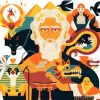Take a look inside 6 images
Mythopedia
Pros: Balancing dense information with appealing design, Mythopedia will easily support initial research and independent study.
Cons: Missed opportunities to support all learners. Just as troublesome: Many ancient African mythologies are omitted.
Bottom Line: A great place to begin or cross-reference research, especially if you're seeking a resource on many of the major ancient mythologies.
How Can I Teach with This Tool?
Mythopedia is a reference site that incorporates tons of information about a selection of global mythologies. It can support independent study as easily as small-group work. Small groups can focus on a specific mythology, deity, etymology, or origin story, or each student can lead a study on an attribute of the ancient civilization's mythology. Similarly, individual students can be assigned specific ancient civilizations to research and then present on. The site features Aztec, Greek, Roman, Celtic, Norse, Egyptian, Chinese, Japanese, and Hindu mythologies.
It welcomes exploration and research alike. Assign students a specific civilization's mythology or deity to research as part of an introduction within a larger multidisciplinary study in world history or before beginning heterogeneous or leveled groups reading specific myths. Students can also use the site to cross-reference research they've already done to check veracity. In addition to the cross-curricular potential with world history, Mythopedia can serve as a resource for projects in art or humanities classes. The Divine Domains section is an especially exciting feature: Students can trace common themes across multiple civilizations and countries, such as love deities, knowledge deities, or trickster deities. However, though it goes beyond the Greek and Roman myths, it still has a ways to go in order to be fully representative. And it is a fully static and passive experience. But as a free resource, it's a solid one-stop shop to start an exploration of mythology.














